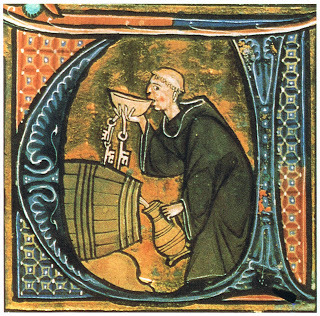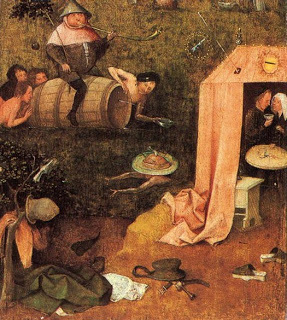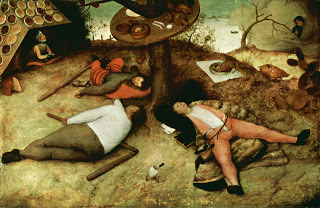Ted Rabinowitz's Blog, page 47
August 7, 2012
Doomsday!
Or rather, Domesday.
 Credit: Prof. J.J.N. Palmer & George Slater.A couple of readers have asked me how I got the medieval stuff so convincing in TWS. First of all, thank you.
Credit: Prof. J.J.N. Palmer & George Slater.A couple of readers have asked me how I got the medieval stuff so convincing in TWS. First of all, thank you.
Second of all, believe me, a lot of it is WILDLY inaccurate, and the sad part is, I'm not even sure which bits. But if I get it right, if I hit a good detail, it's because of this - PRIMARY TEXTS.
Here. I'll say it again, with the echo chamber sound effect:
PRIMARRRYYYY TE-EH-EH-EH-EXTS.....
Primary texts: those documents produced by people during the period in question. The Declaration of Independence is a primary text. So is the Stamp Act. So, for that matter, are the epitaphs on the tombstones in the Old Granary Burying Ground in Boston.
Why am I giving you all this blah-di-blah? Because the Domesday Book, one of the great primary texts of all-frikkin'-time, is available free online in a fully hyperlinked format.
On one level, Domesday is nothing more than a giant real estate assessment. And to a historian, its principal value is how it delineates Eleventh Century British society. But to a writer, it contains little details that are pure gold.
Take names, for instance. Just about every medievalish writer uses different variations of William, Henry, etc. But how Svavi of Bosworth? Aelric son of Mergeat? Leofric of Willoughby? Weird (by modern standards), memorable - and utterly authentic. I'd spend hours trying to come up with names like that, and I'd fail every time.
Or the fact that there are out-and-out slaves in Merry Olde Englande? We're all accustomed to the misery of the serfs who were tied to the land and their lord, but for some reason slaves don't appear that much in High Medieval fantasy and fiction. And yet there they are, listed in black and white in the DB.
Look at it long enough, and how it classifies people (smallholder, slave, priest, villager, etc.) and property ("Woodland 80 swine render. 2 mills, value 1.2. 1 church") and you begin to see how the king's clerks saw the world back then.
If you want flavor in your fiction, nothing beats a primary text.
 Credit: Prof. J.J.N. Palmer & George Slater.A couple of readers have asked me how I got the medieval stuff so convincing in TWS. First of all, thank you.
Credit: Prof. J.J.N. Palmer & George Slater.A couple of readers have asked me how I got the medieval stuff so convincing in TWS. First of all, thank you.Second of all, believe me, a lot of it is WILDLY inaccurate, and the sad part is, I'm not even sure which bits. But if I get it right, if I hit a good detail, it's because of this - PRIMARY TEXTS.
Here. I'll say it again, with the echo chamber sound effect:
PRIMARRRYYYY TE-EH-EH-EH-EXTS.....
Primary texts: those documents produced by people during the period in question. The Declaration of Independence is a primary text. So is the Stamp Act. So, for that matter, are the epitaphs on the tombstones in the Old Granary Burying Ground in Boston.
Why am I giving you all this blah-di-blah? Because the Domesday Book, one of the great primary texts of all-frikkin'-time, is available free online in a fully hyperlinked format.
On one level, Domesday is nothing more than a giant real estate assessment. And to a historian, its principal value is how it delineates Eleventh Century British society. But to a writer, it contains little details that are pure gold.
Take names, for instance. Just about every medievalish writer uses different variations of William, Henry, etc. But how Svavi of Bosworth? Aelric son of Mergeat? Leofric of Willoughby? Weird (by modern standards), memorable - and utterly authentic. I'd spend hours trying to come up with names like that, and I'd fail every time.
Or the fact that there are out-and-out slaves in Merry Olde Englande? We're all accustomed to the misery of the serfs who were tied to the land and their lord, but for some reason slaves don't appear that much in High Medieval fantasy and fiction. And yet there they are, listed in black and white in the DB.
Look at it long enough, and how it classifies people (smallholder, slave, priest, villager, etc.) and property ("Woodland 80 swine render. 2 mills, value 1.2. 1 church") and you begin to see how the king's clerks saw the world back then.
If you want flavor in your fiction, nothing beats a primary text.
Published on August 07, 2012 15:58
August 4, 2012
Value-Added, Meet Value-Subtracted
So instead of just showing coverage of the Olympics - period. Full stop. - NBC airs documentary retrospectives of Kerri Strug. Interviews with Ryan Seacrest.
Are you kidding me?
Congratulations, NBC: You have officially invented value-SUBTRACTED entertainment.
Shut the F up and show more of the actual 2012 Olympics.
Morons.
Are you kidding me?
Congratulations, NBC: You have officially invented value-SUBTRACTED entertainment.
Shut the F up and show more of the actual 2012 Olympics.
Morons.
Published on August 04, 2012 10:51
August 1, 2012
Why Joss Whedon Is Awesome and I Liebehassen Him
 Hate/love - when someone is so damned good that you hate him for being better than you even while you love what he does. It's an emotion common among creative types and athletes. I felt it for Neil Gaiman when he was writing The Sandman. And of course, I feel it for Joss Whedon.
Hate/love - when someone is so damned good that you hate him for being better than you even while you love what he does. It's an emotion common among creative types and athletes. I felt it for Neil Gaiman when he was writing The Sandman. And of course, I feel it for Joss Whedon.Okay, so we all know Joss is awesome. But let's dissect this for a moment. Forget about him inventing two whole new kinds of dialogue (Buffyspeak and Firefly), or reintroducing gunpowder and horses to space opera. Let's go almost all the way back, to when Buffy was a mid-season replacement that was supposed to flicker and vanish; instead it grabbed hold of people's eyeballs and wouldn't let go. Why?
Metaphor.
I've riffed on metaphor before. One of the classic, unmentioned techniques of fantasy is to make magic a stand-in for some other aspect of the human experience: a scarce resource; or codependent love; or slavery; or addiction.
Joss glommed on to metaphor like a tick onto a pint of O-negative and then reversed the process. On those first episodes of Buffy, magic wasn't a stand-in for life; life stood in for magic. Magic was the X-factor that let Joss, David Greenwalt and the other writers juice up the hamster of life until it was a giant Sumatran rat that ate your brain. Magic turned peer pressure into a possessing hyena spirit; magic let a vicious stage mother literally live out her cheerleading dreams through her daughter; magic made an internet pen pal a horrifying demon and loaded the first possibility of sex with the certainty of death.
Whether magic operates as some other, more familiar process, or is the excuse to extend the human experience to the extreme, the connector is life. Human lives. Link the magic in your story to that, either as cause or effect, and you're on solid ground.
Published on August 01, 2012 13:01
July 31, 2012
Classic Ideas in Fantasy and Science Fiction: First Contact
The biggie. The most important trope in science fiction...after guys in red shirts getting killed, of course. E.T., War of the Worlds, Close Encounters, Contact, Star Trek XXXIV, and on and on.
The Mote in God’s Eye, Larry Niven and Jerry Pournelle
"A Martian Odyssey," Stanley G. Weinbaum
“First Contact,” Murray Leinster
"The Helping Hand," Poul Anderson
The Martian Chronicles, Ray Bradbury
2001, A Space Odyssey, film, Stanley Kubrick and Arthur C. Clarke
Close Encounters of the Third Kind, film, Steven Spielberg
The Day the Earth Stood Still, film, 1951, Robert Wise, Harry Bates, Edmund North
ET, film, Steven Spielberg
The Man Who Fell to Earth, film, Walter Tevis, Nicolas Roeg
Solaris, Stanislaw Lem
Contact, Carl Sagan
Similarly:
A Signal From Space, Will Eisner (graphic novel)
His Master's Voice, Stanislaw Lem
The Hercules Text, Jack McDevitt

The Mote in God’s Eye, Larry Niven and Jerry Pournelle
"A Martian Odyssey," Stanley G. Weinbaum
“First Contact,” Murray Leinster
"The Helping Hand," Poul Anderson
The Martian Chronicles, Ray Bradbury
2001, A Space Odyssey, film, Stanley Kubrick and Arthur C. Clarke
Close Encounters of the Third Kind, film, Steven Spielberg
The Day the Earth Stood Still, film, 1951, Robert Wise, Harry Bates, Edmund North
ET, film, Steven Spielberg
The Man Who Fell to Earth, film, Walter Tevis, Nicolas Roeg
Solaris, Stanislaw Lem
Contact, Carl Sagan
Similarly:
A Signal From Space, Will Eisner (graphic novel)
His Master's Voice, Stanislaw Lem
The Hercules Text, Jack McDevitt
Published on July 31, 2012 11:32
July 29, 2012
Industrial Revolution Mark Two
 So I was watching the Olympic opening ceremonies. I was a little puzzled. These are the first opening ceremonies I've seen, so I don't have a yardstick. But...flying Mary Poppinses? A nod to the NHS?
So I was watching the Olympic opening ceremonies. I was a little puzzled. These are the first opening ceremonies I've seen, so I don't have a yardstick. But...flying Mary Poppinses? A nod to the NHS?I did like the ending, though. Forging the rings...hmm. Tolkien reference.
Still, I can see it appealing to the Steampunks among us. IKB rules!
Published on July 29, 2012 11:42
July 28, 2012
Cause and Effect
 Waiting on the Hyperspace Pizza NexusScience fiction isn't about causes. Cause is a "how," and ultimately, "how" is not important. Do we need to know exactly how the warp drive works? No. We just need to know what happens when it does. We need to know the effect: How will we react when the universe is open to us? Will we be humbled by the majesty of creation and become more enlightened beings? Will we push our edge in interstellar travel to build the Terran Empire? Will we use it to make faster pizza deliveries to Glornak 7?
Waiting on the Hyperspace Pizza NexusScience fiction isn't about causes. Cause is a "how," and ultimately, "how" is not important. Do we need to know exactly how the warp drive works? No. We just need to know what happens when it does. We need to know the effect: How will we react when the universe is open to us? Will we be humbled by the majesty of creation and become more enlightened beings? Will we push our edge in interstellar travel to build the Terran Empire? Will we use it to make faster pizza deliveries to Glornak 7?Or telepathy. Does it really matter just how humanity develops this mental power? No. What's interesting is how the "normals" react to the espers...or whether the entire race becomes telepathic. Then what happens? Well, for one thing, speech pathology is no longer the go-to career for former actresses.
The importance of effects over causes is one of the big reasons to be wary of the "info dump" - the deep-seated urge to explain your entire world to the reader in one or two bloated, digressive paragraphs. Pay more attention to what happens next than what happened before.
Published on July 28, 2012 23:14
The best science fiction
The best science fiction isn't about causes; it's about effects.
More on this in the next post....
More on this in the next post....
Published on July 28, 2012 16:15
July 24, 2012
The Original Wild and Crazy Guys
 So yesterday, I threw up a little Minka Kelly on the blog in a fan service-y, not-much-content kind of way. Not the worst sin in the world, but I think maybe it's time we go back to future. Well, the future if you're a citizen of Imperial Rome. If you're not, it's more like the past. I'm going to get all medieval on your asses with a new bit o' history that some of you may not know:
So yesterday, I threw up a little Minka Kelly on the blog in a fan service-y, not-much-content kind of way. Not the worst sin in the world, but I think maybe it's time we go back to future. Well, the future if you're a citizen of Imperial Rome. If you're not, it's more like the past. I'm going to get all medieval on your asses with a new bit o' history that some of you may not know:Goliard.
 What are they?
What are they?Short answer: Half-drunk college students.
Long answer: All-drunk, philandering, slandering, over-educated clergymen who vandalized services and scandalized priests from the Twelfth to the Thirteenth Centuries.
They staged obscene plays in front of cathedrals. They led donkeys in costumes up to the altar rail and disrupted the Mass. They ate their sausage lunches on the altar, mocked the local bishops, and burned old shoes in the incense burners. They wandered from town to town in an age when most people died less than fifty miles from where they were born. They were, in their way, the last gasp of paganism until the Renaissance. They got drunk, got into brawls, and wrote the best Latin poetry in two hundred years. Of course, half of it was drinking songs and the other half was satires of the Church, but still.
The fact that they were both college students and clerics might cause a bit of cognitive dissonance to modern minds. Back then, the Church had something like a data monopoly in Christian Europe. The universities evolved from cathedral schools and monastic schools, and weren't autonomous until the 13th Century. If you wanted to study, the best way to do it was to take vows.
That didn't necessarily mean becoming a priest. In addition to the "major orders" - bishop, priest, and deacon - there were the "minor orders" of acolyte, lector, exorcist and porter. These minor orders didn't demand the same life changes as the major orders, and they had benefits. Like not being tried in a secular court of law, but in a church court, which was much, much cushier.
So there were huge incentives to be a minor-orders guy. And since there were huge incentives, there were a LOT of clergy. One estimate was that one out of every five men in England in the middle of the Twelfth Century had taken vows of some kind.
And what happens when you take well-educated, not particularly celibate, not notably hardworking students and shove them all together in big cities like Paris and Boulogne? Lots of drinking, fights, sex and racy Latin poetry.

To be fair, they were also motivated by the Church's corruption and the failures of the Crusades. And when a single institution spans the entire continent and not only lays claim to your behavior in this life, but your fate in the next, it takes some guts to tell the hierarchy to go shove it. But the goliards did, for a century and half, until the Church finally clamped down on them, hard, about 1300: church councils against them, and the ultimate penalty of defrocking.
Next goliard post: Some more drinking songs! Yay!
Published on July 24, 2012 19:44
July 23, 2012
In Which I Admit To Being Like Every Other Blogger
IT is a truth universally acknowledged, that a blogger seeking to improve visitor statistics must be in want of a hot topic on the Web. However tedious Google Analytics may seem to such a person, he is widely and cynically believed to be mining search engines in search of crowd-pleasing nuggets of infotainment.
Alas. It is totally frikkin' true.
 So: Minka Kelly. Minka Kelly! MINKA KELLY! Come to me, oh webcrawlers and searchbots! Heed my summoning words! MIIIINNNKAAAA....KKEELLLLLYYYY....
So: Minka Kelly. Minka Kelly! MINKA KELLY! Come to me, oh webcrawlers and searchbots! Heed my summoning words! MIIIINNNKAAAA....KKEELLLLLYYYY....Oh, all right. There's got to be some way I can connect Minka to some nerdliness to make this legit.
Well, there is a longstanding tradition of nerds panting after gorgeous women in the media. Absolutely. Fan service!
You're welcome.
Published on July 23, 2012 15:50



